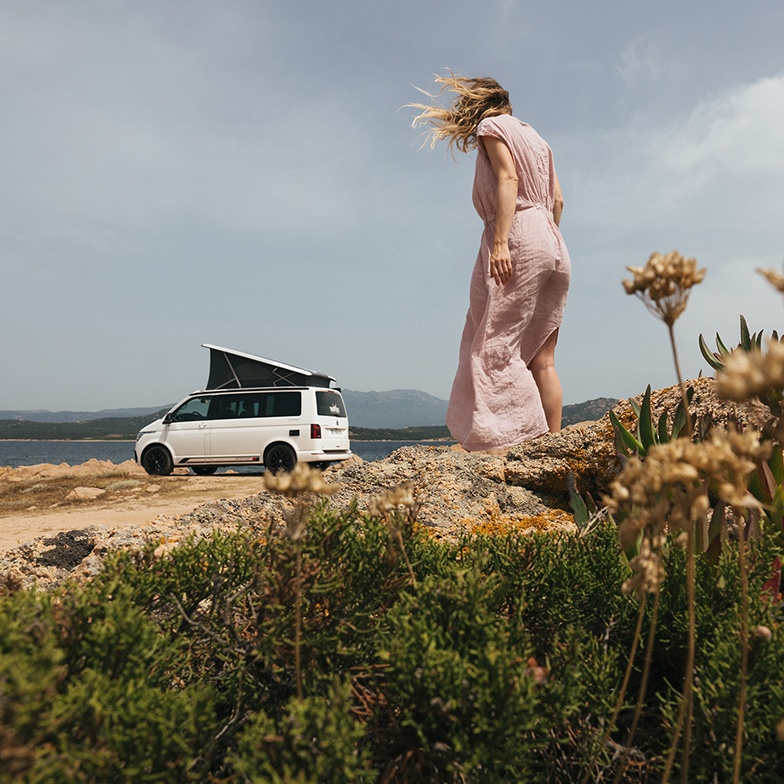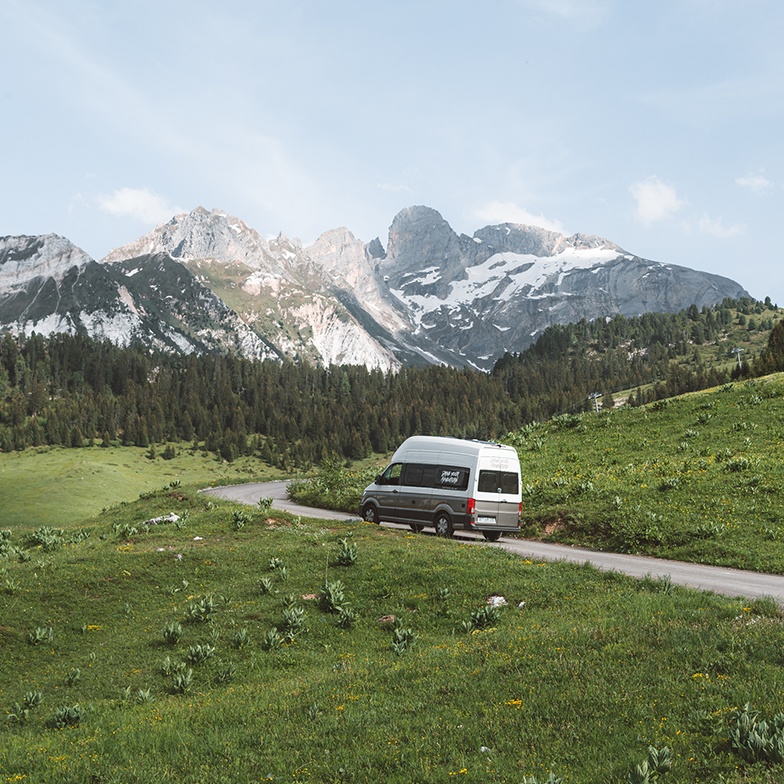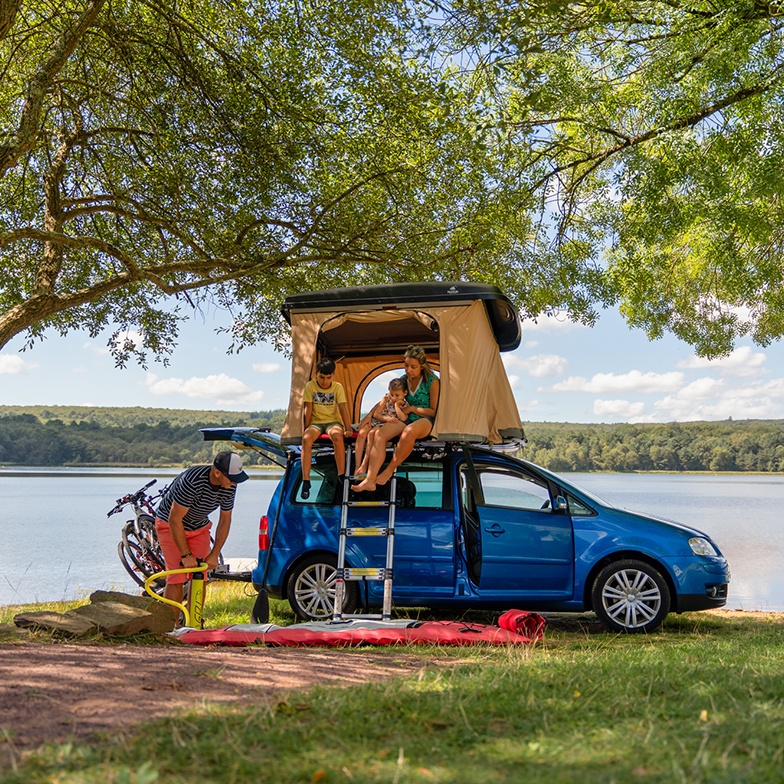Your campervan trip is sure to be an adventure. Preparing for every adventure is an important step so that once you’ve headed out, all you have to do is let yourself get carried away. You will be free to explore and to open your senses to all the things an adventure always brings: the charm of the unknown, one-of-a-kind experiences and all the magical moments that await.
We’ve put together some advice and information to help you prepare for your campervan adventure.
Preparing for the start of your wevan campervan hire
Have you just reserved your van for a magical adventure? Wise decision! But before leaving, let us tell you about what to expect.
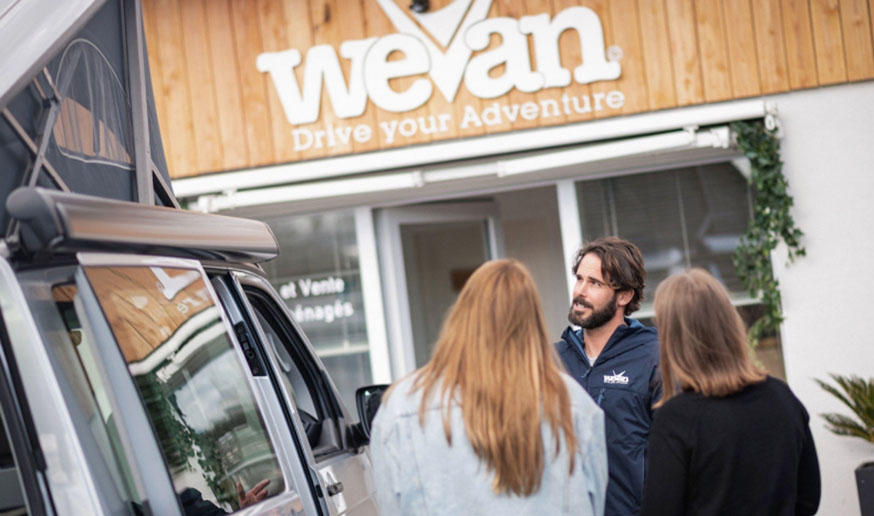
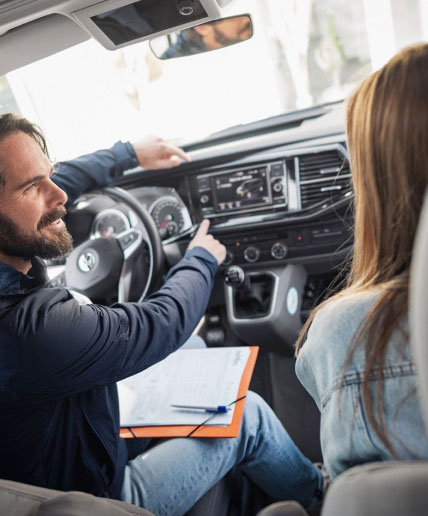
Arriving at the WeVan agency
If you’re planning to come in your own vehicle, most of the time (it depends on the agency so contact them to find out) you can park for free in our car park for the duration of your rental (at your own risk). If you’re coming by other means of transport, please feel free to contact us about arranging a transfer from any tram, metro or train station or airport. Finally, we can also organise the provision and recovery of your campervan (depending on the agency and subject to certain conditions).
The last steps before leaving
On the day of departure, we will have some small paperwork to take care of together at the agency.
You're making the final adjustments to your rental
If you want to change your insurance package ("protection pack") or add options such as an extra driver, speak now or forever hold your peace! If the booking has not yet been paid in full, it's also time to settle up. Please note that cheques and cash are not always accepted: check with your agency beforehand.
You will pay the security deposit
The security deposit is made by taking a copy of your bank card (authorised debit). Therefore, don’t forget to ensure you have the vital bank card on you and, if necessary, to request that your bank manager (or your banking App if the latter no longer exists, this is the 21st century after all!) increases your payment ceiling so that the security deposit request goes through. The deposit amount depends on the protection pack you’ve taken out: you will find this in your reservation confirmation email. If everything goes well (in 99.999% of cases, give or take), the deposit is cancelled a few days after you return.
We will make a copy of the driving licence(s)
A valid National Identity Card or passport in the same name.
You will sign the rental agreement and we will both sign the van condition inventory
Paper or digital format, depending on the agency.
Your campervan is ready to go
And there we have it! We have managed to find our way through the administrative labyrinth and can now glimpse the fruits of your nomadic quest... a campervan! Before leaving, we will take the time to show you how everything works in detail (around 30 minutes for new users).
If you want to do a bit of cramming before leaving (very strongly advised if you want to get your Doctorate in Van Studies), please visit the WeVan tutorials on our Youtube channel.
The van is handed over to you with all the essential levels checked and adjusted, as well as a full fuel tank and full drinking water tank. We will have also checked if there is still gas in the bottle but, with a view to finishing all opened bottles before changing them, we cannot guarantee how much gas is left in them. Therefore, you may need to change the bottle during your trip (we will show you how to do this during the handover presentation). The bottles are returnable and you only pay for the gas by returning the empty bottle when you buy a new one. If you go abroad, it’s worth checking that the bottles are compatible (this is not the case in Spain, for example). Depending on demand and the stock of bottles available in the agency, we can give you an extra bottle.
And there you go - you’re ready for your completely independent campervan road trip as soon as you leave the WeVan agency!
the check-list for
your campervan road trip
To provide you with the utmost comfort during your travelling adventure, we have selected and equipped your campervan with an array of quality accessories (the only thing you need to worry about is not forgetting your socks!).
Equipment and accessories included
in your WeVan rental
- kitchen equipment, including dishes (stoneware plates, cutlery, wine glasses, plastic ecocup, mugs), frying pan/pot with lids, colander, can opener, peeler, bottle opener, corkscrew, kettle, coffee maker, cutting board, knife, brush and cleaning cloth;
- “european” extension lead to connect the campervan to a 230v mains supply (depending on the model);
- mattress protector(s) and fitted sheet(s);
- outdoor folding table and chairs;
- hose for filling clean water;
- brush or small hand vacuum;
- fire blanket or extinguisher.
Optional accessories
Depending on your requirements (and availability) you can complement your campervan experience with accessories such as:
- bike rack to safely carry up to 4 bikes on the tailgate or tow-bar;
- cardboard foldable dry toilets, which can be reused throughout your trip;
- bedding pack containing one double duvet + cover and two pillows + cases;
- infant/child seat;
- ...
Items we suggest you bring
Non-exhaustive list.. if such a thing exists (it's up to you if you want to pack your metal detector if that’s the quest you're on!).
Paperwork
- National identity card
or passport - Valid driver’s license
- Some countries request the original copies of the van papers: check and let us know
Daily items
- Pillows, duvet or quilt
- Sleep eye masks and earplugs
- Lighter and matches
- Multifunctional knife
- Rubbish bags
- Toilet paper
- Clothesline and pegs
Outdoor items
- Swimwear
- Thin puffer jacket/gilet
- Windbreaker jacket
- Walking shoes
- Head lamp
- Water bag or flask
Eco-friendly essentials
- Water flask & filter
- Re-usable bag (for shopping)
- Large bags
- Washable cloth or tea towel
- Cosmetics and washing-up liquid
And if you need to complete your equipment, visit our partner Casambu, the specialist in quality vanlife accessories. Our friends Ori & Aurel, in partnership with WeVan, are pleased to offer you 10% discount thanks to the code CASAMBU-WEVAN-10 on their entire e-shop*!
* valid on the first order, excluding delivery costs. Offer cannot be combined with other offers
Travelling in a campervan
Whether you’re about to spend your first night in a campervan or you're already a compulsive nomad, a quick overview of the options available to you for places to stay at night, as well as a reminder of the legislation and good conduct rules to follow, are essential. Freedom, yes, but with respect for the rules, others, the environment... and mostly common sense!

Short summary of the legislation on wild camping
In France, spending the night in a van is likened to wild camping. The general rule is that wild camping (performed alone and not on a landscaped area) is tolerated...that’s to say wherever it’s not regulated.
For example, it is prohibited on classified sites, natural reserves, public roads and streets and seashores.
In the public domain, it may also be prohibited locally by municipal or prefectural decree, which is becoming more and more the norm each year (particularly in high tourism areas and in peak season). Prohibited zones are therefore ostensibly marked with no parking signs. In the event of an offence, the offender might find themself in the unpleasant situation of having to move on in the middle of the night and/or finding a small white piece of paper slid underneath their windscreen wiper in the early hours of the morning.
For further information visit
service-public.fr | legifrance.gouv.fr
⚠️Every country has its own legislation on wild camping, so make sure you remember to find out what applies when organising your trip.
Where can you sleep with your campervan?
Take into account the advantages and disadvantages of each region and season, combine that with everyone’s different tastes and ways of travelling, and add in a pinch of good manners when balancing up the 4 main overnight options available to you!
To help you decide, we suggest a few essential sites or apps:
- Park4night : to find a lovely spot in the middle of nature, a campsite or a dedicated service area for campervans on your route.
- HomeCamper : to find a beautiful spot with a host.
- France Passion : for a stop with farmers, winemakers or artisans.
In the middle of nature
Budget: free
Wild camping is the essence of vanlife itself and one of its great promises. It is also a regulated activity which, as travellers, makes us responsible towards others and the environment.
Show more
To find a good spot to spend the night, our first instinct is to look at a detailed map (such as Google Maps in satellite mode): even if it still remains a surprise, we quickly learn how to identify suitable locations. You can also use mobile applications to help you such as Park4night which lists wild locations (practical, but visited frequently).
Listen to your instincts and your own tastes by trying to distance yourself from the most popular areas and by favouring small back roads.
Staying with a host
Budget: €0 - €30
While meeting a farmer or a local at a bend in the road and being invited to spend the night on their land may be one of the lucky human experiences that are a part of nomadic life, there are also services to put people in touch with each other.
Show more
By staying with a host or on a farm, you have access to a patch of land to spend the night in your campervan, with no or few neighbours and some services: parking only, water, electricity, toilets, shower, laundry, breakfast, swimming pool... each with their own facilities and price.
This solution often seems to be a good compromise between camping and wild camping, between a peaceful night and a natural setting, which often come with the key to wonderful encounters...plenty of good advice on the surrounding area or a basket full of local products bought from your host.
In a dedicated campervan service areaBudget: €0 - € 25
Service areas for leisure vehicles are provided by municipalities (and listed on the indispensable Park4night).
Show more
While they make look the same from one municipality to another, these spots often have the advantage of being very close by to notable sites of interest: historic villages or beaches. Obviously, they are heavily visited in the summer and it's most likely that you’ll overhear your neighbours’ conversations. Often the service areas provide access to toilets, a clean water point and a drain for wastewater. Often the stay is free and you only have to pay for the water and electricity. On other service areas, the number of nights stay is limited: each local council has their own policy!
At a campsite
Budget: €15 - €70
In France, private or municipal campsites cover the whole country and offer a variety of experiences often resulting in some lovely surprises. Our advice is to go for modest-sized campsites which are well integrated into their environment (maximum 20 pitches).
Show more
While spending the night in a campsite is not exactly the heart’s desire of a “die-hard” vanlifer, it still offers a range of services essential to vanlife that we need to find from time to time (recharging batteries, draining wastewater, refilling clean water, doing a load of washing, taking a hot shower, etc.). For your first experience in a campervan, planning your first nights in a campsite enables you to tackle your road trip calmly by focusing on what’s important: finding your feet aboard.
Lastly, campsites remain one of the unavoidable options for all areas where wild camping is regulated. However, pay attention to availability in peak season and to closing times during low season.
The WeVan charter for van travellers
When heading out in a WeVan campervan, we ask that you commit to respecting some specific fundamental principles. It’s only by looking out for others and our environment that we’ll be able to continue to enjoy this unique way of travelling.
Let’s respect others
- Let’s respect the local legislation in force on wild camping and seek permission from private land owners.
- Let’s restrict when and where we set up for the night (setting up late in the evening and packing away early in the morning).
- Let’s travel in small numbers and not stay more than several nights in the same spot.
- Let’s use common sense and good manners towards our nomadic or sedentary neighbourhood (specifically be attentive to noise pollution).
Let’s respect nature
- Let’s only park in suitable locations, while always ensuring not to damage vegetation or obstruct traffic.
- Let’s respect flora and fauna everywhere (don’t disturb animals and don't pick plants).
- Let’s only light fires in nature where it’s permitted to do so (in accordance with local legislation) without risk (season, wind, location) by making a point of using old firepits and without damaging vegetation.
Let’s limit the impact of our road trip
- Let’s always empty our wastewater tanks in the drains provided for this purpose and never leave the taps for our drains open.
- Let’s not leave any trace of our stay: use bins if there are any or take all our rubbish away with us (and recycle it).
- Let’s not leave our toilet paper behind: preferably let’s take it with us (bin) or if not then burn it (only if fires are permitted locally and if there is no risk of fire) or bury it (using eco-friendly paper).
- Let’s try to leave the places where we stop and camp cleaner than when we found them.
- Let’s ban single-use plastics from our campervan road trip (all the kitchenware is provided) and let’s try not to use wet wipes.
- Let’s favour using ecological cosmetics (soap, shampoo, toothpaste, etc.) and household products (washing-up liquid) (without synthetic washing agents or dyes) and if possible solid and/or in bulk.
- Let’s aim to consume local products and where possible choose direct sales throughout our van trip.
We should evoke Baden-Powell’s advice in principle: ‘When you leave your camp, take care to leave behind two things. Firstly: nothing. Secondly: your thanks.’ The main thing? Tread lightly on the earth’s surface.
Sylvain Tesson
In the forests of Siberia, Gallimard edition, 2011
